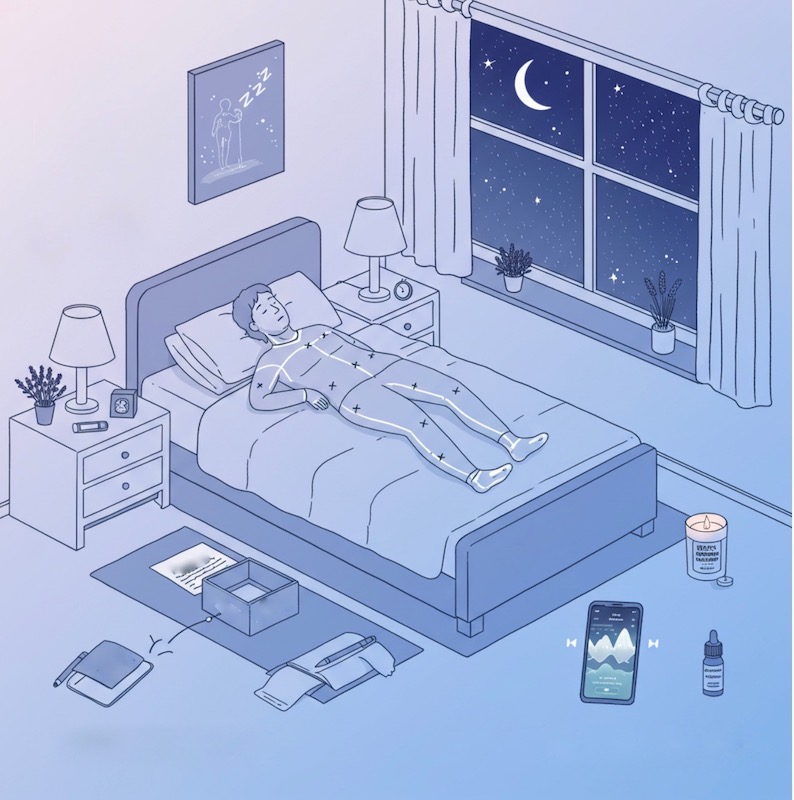As World Sleep Day approaches on Friday, 14 March 2025, many of us may be reflecting on the importance of a good night’s sleep – especially in our increasingly busy lives. Poor sleep can affect our overall health, productivity, and mental wellbeing, but fortunately, expert hypnotherapist Marygrace Anderson has shared some practical techniques to help us reclaim our rest and rejuvenate our minds and bodies.
Anderson, known for her expertise in relaxation and sleep therapy, believes that restful sleep doesn’t have to be elusive. With the right techniques, anyone can train their body and mind to relax, quiet the chatter, and drift off into a peaceful slumber. Here are some of her top sleep tips to celebrate World Sleep Day.
The Silver Mind Technique
One of Anderson’s favourite methods for falling asleep is the Silver Mind Technique. This simple, yet effective practice involves writing a number inside a circle. Then, you write the phrase “Very sleepy” over the number. As soon as you feel your attention wane, erase the number and write the next one, repeating the process until you naturally drift off to sleep.
“The technique works by helping you focus on a repetitive, calming task, which draws your attention away from anxious thoughts or worries,” Anderson explains. “The act of writing and erasing is meditative, helping you relax and prepare your mind for sleep.”
Body and Mind Relaxation
Another fundamental method to unwind and prepare for sleep is Body and Mind Relaxation. Anderson recommends starting with your toes and working your way up, consciously squeezing and then relaxing each part of your body.
“Begin at your toes, and work your way up through your legs, torso, arms, and head,” she advises. “With each exhale, imagine letting go of the tension in that part of your body. This deep relaxation technique allows your body to fully unwind and helps you let go of stress.”
As you progress through each body part, Anderson suggests repeating a calming mantra, such as, “I am relaxed, and I am ready for sleep.” This method works wonders to alleviate both physical and mental stress.
The Worry Box Method
One common barrier to a restful night is the mind’s constant stream of worries. Anderson suggests a practical tool to quiet these concerns – the Worry Box.
“Write down any worries or concerns on a piece of paper before bed, then place them in a box or drawer. This simple act of putting your worries away allows your mind to ‘let go’ and enjoy the peace of the night,” Anderson explains. “You can always revisit them in the morning, but for now, let them be.”
This technique helps create a psychological boundary between your worries and your sleep, giving you permission to rest without feeling like you’re neglecting your responsibilities.
Count Backwards or Focus on a Visual
Another trick is to mentally count backwards. Anderson recommends starting from 300 and counting down slowly, concentrating on each number. The focus on numbers helps to slow down your thoughts and relax your mind.
“If you lose track of where you are, just go back to 300,” she says. “The repetitive nature of the counting can help you drift off naturally.”
Alternatively, some individuals find it helpful to focus on calming images. Whether it’s imagining ocean waves, a rainstorm, or simply staring at a candle, this method draws your attention to something soothing, encouraging relaxation.
“Visualisation techniques work well for many people, as they provide a calming distraction from the day’s thoughts,” Anderson explains.
Tech Solutions for Sleep
In today’s tech-driven world, there are plenty of apps designed to help with relaxation. Anderson recommends using the Relax Melodies App, which offers a variety of soothing sounds, including rain, ocean waves, and ambient noises. Many of these apps also have meditation sections, which guide you through calming exercises that help bring you into the present moment – ideal for settling your mind before sleep.
“For those who struggle with intrusive thoughts, meditation apps can be a great way to quiet the mind and prepare for rest,” Anderson says.
Natural Remedies for Restful Sleep
In addition to relaxation techniques, natural remedies can also play a role in improving sleep quality. Anderson often recommends Bach’s Rescue Remedy Sleep range, which includes flower essences designed to ease anxiety and promote restful sleep. Alternatively, products like those from ThisWorks.com offer sleep-inducing scents and oils that promote relaxation through aromatherapy.
“Bach’s Rescue Remedy and other sleep-specific products can help to alleviate the stress that keeps us awake at night,” she notes. “These remedies can complement your relaxation practices, enhancing the overall quality of your sleep.”
Sleep for Better Health
Good sleep is integral to both physical and mental health. Anderson reminds us that we need sleep to rejuvenate both body and mind, saying, “Sleep isn’t just about resting – it’s about giving your body the time it needs to heal, repair, and process emotions.”
As World Sleep Day reminds us of the importance of sleep, these techniques – ranging from the Silver Mind Technique to natural remedies – are just a few tools that can help you improve your sleep hygiene. Whether you’re struggling with sleep deprivation or simply want to optimise your rest, Anderson’s methods provide practical, effective ways to ensure you’re waking up refreshed and ready for the day ahead.
Take Action for Better Sleep This World Sleep Day
In honour of World Sleep Day 2025, consider implementing one or more of these techniques to help create a sleep routine that works for you. By committing to these strategies, you can enhance your wellbeing and ensure that you get the quality sleep you deserve.
Special offer given to London Mum’s Magazine readers, with a simple promo on Marygrace’s website – Get 10% off a first session valid until 31st March 2025 using “London Mums”.
Related articles




